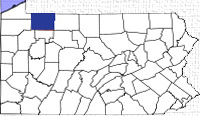On the 26th of September, 1862, First Lieutenant George R, Wetmore,
with some thirty or more men recruited for the cavalry service, left Warren
for Erie to join another detachment under Captain Miles, and thus was formed
the command subsequently known as Company I, of the Fourteenth Cavalry.
The men who left with Lieutenant Wetmore were named as follows : Quartermaster-
sergeant, Reuben Mason; Sergeant David R. Alexander; Corporals
Allen E. B. Mann, William V. Ford, John S. Turner, Horace Robinson; Saddler
Bennett M. Metier; Privates John P. Baxter, Edmund R. Cowell, Levi
W. Crouch, Van Rensselaer Farey, M. D. Ford, Elias Frear, Francis H. Freeman,
Albert G. Hamblin, Francis Hook, Philip Hoffman, Charles L. Jeffords,
John C. Jordan, Patrick Keefe, Alvah H. Mann, L. Phillips, William Prindle,
Reuben Rhoads, Joseph B. Rhinehart, Joseph Sands, Leroy Turner, James
Upton, John Upton, William H. Wentworth, Ashley F. Winchester, and Richard
W. Winchester.
The regiment rendezvoused in camp near Pittsburgh, where, on the 24th
of November, a regimental organization was completed by the choice of James
M. Schoonmaker as colonel; William Blakely, lieutenant-colonel; Thomas
Gibson, Shadrack Foley, and John M. Daily, majors. On the same day the
regiment moved forward towards Hagerstown, Md., where horses, arms, and
accoutrements were received and a spirited training for cavalry service commenced.
On the 28th of December the command moved to Harper's Ferry,
and went into camp on the Charlestown Pike, the advance post of General
Kelly's command. It was here actively engaged in picketing all the approaches
from the south and east, and scouting the region on both sides of the Shenandoah
River, extending far into the passes of the Blue Ridge, and occasionally
skirmishing with the guerrilla bands of White and Imboden. On the night of
April 13, 1863, Lieutenant Wetmore, in command of the picket guard, handsomely
repulsed an attack of dismounted rebel cavalry on the Keyes Ford
road, and was highly complimented in general orders by the general in command.
Early in May, 1863, the regiment was attached to General Averell's command,
and for a time assisted in holding the towns of Phillippi, Beverly, and
Webster, in guarding the Baltimore and Ohio Railroad and in numerous scouts
and movements against the enemy. When the rebel army retreated from the
field of Gettysburg the regiment joined in the pursuit, and formed a junction
with the Army of the Potomac at Williamsport, Md., on the 14th of July; but
Lee had made good his escape across the Potomac the day before.
On the 4th of August General Averell moved with his command on what
was known as the Rocky Gap raid. When approaching Moorefield, Captain
Kerr, of the Fourteenth, with a detachment of about fifty men who had been
ordered to move on a mountain road to the left, after having captured some
guerrillas, fell into an ambuscade, and though fighting manfully was worsted,
and made his escape with only a fragment of his command, with difficulty.
Moving through Petersburg and Franklin, continually skirmishing by the way,
and driving "Mudwall" Jackson, after a brisk engagement at Warm Springs, the
command, on the 29th of August, encountered the rebel General Jones near
Greenbrier White Sulphur Springs, and at once attacked. The Fourteenth
dismounted, and held the right of the line. The battle raged fiercely until
nightfall. The enemy contested the ground stubbornly, but he was pushed
back about three hundred yards. Three determined infantry charges of the
rebels were handsomely repulsed by the Fourteenth. During the night skirmishing
was kept up, the enemy delivering an occasional volley. Assistance
was momentarily expected from General Scammon, commanding in the Kanawha
Valley, and who was supposed to be at Lewisburg, ten miles distant.
The enemy was reinforced during the night, and the battle was renewed on the
following morning; but no assistance coming to the Union forces, and their
ammunition running low, a retreat was ordered. The loss in the Fourteenth
was eighty in killed, wounded, and missing. Beverly was reached on the
31st, the command having been on the march or closely engaged for twenty seven
consecutive days, and traveled over six hundred miles.
On the 1st of November General Averell again led his command southward
on the Droop Mountain raid. Crossing Cheat Mountain, he reached
Huntersville on the 4th, whence, after detaching the Fourteenth Pennsylvania
and the Third West Virginia Cavalry, he sent them by a detour from the main
road on which he advanced, to cut off a brigade of the enemy, said to be stationed
at Greenbrier Bridge, under command of "Mudwall " Jackson. But
both roads were found obstructed by fallen timber, and the wily rebel made
good his escape. At Droop Mountain the Fourteenth came up with the
enemy and drove him rapidly to the summit Here he had intrenched, and
was prepared with artillery to fight, but by flanking the position with infantry,
and pressing closely in front with dismounted cavalry, he was driven with the
loss of two pieces of artillery and almost his entire train. Pursuit was made
as far as Lewisburg, but the troops failed to again overtake him.
By easy marches the command then returned to New Creek, on the Baltimore
and Ohio Railroad, with the expectation of going into winter quarters;
but on the 8th of December Averell was again in the saddle, faced for Salem.
By rapid marching, much of the time in the midst of heavy rains, he arrived
at his destination on the 16th, and immediately commenced the work of
destruction of the Virginia and Tennessee Railroad, and the immense stores of
the rebel army there collected. Several long bridges, and miles of track were
destroyed, besides depots, mills, and warehouses, with grain, meat, salt, clothing,
and merchandise, to the value, as was estimated, of from two to five millions
of dollars. Intelligence of this daring movement, and the immense
destruction effected, soon spread, and the enemy in heavy force was moving
up rapidly on all sides for Averell's capture. The retreat was accordingly
commenced and pushed with all celerity, though greatly retarded by heavy
rains and swollen streams. The rebels believed that the capture of the entire
command was sure, and were already debating among themselves upon the
kind of punishment that should be meted out to the bold "Yankees." By
skillful demonstrations, however, the route of the column was concealed, and
Averell succeeded in eluding the hostile forces. "I was obliged " says Averell
in his report, "to swim my command, and drag my artillery with ropes
across Craig's Creek, seven times in twenty-four hours." The creek was deep,
the current strong, and filled with drifting ice. On the 20th, at Jackson
River, the Fourteenth, while in rear struggling with the wagon trains, which
could with difficulty be moved, the horses and mules being worn out with incessant
marching, was cut off from the main column by the destruction of the
bridge, and was supposed at headquarters to have been captured. General
Early had demanded its surrender under a flag of truce; but, setting fire to
the train which was completely destroyed, it forded the stream and made
good its escape, rejoining the column between Callahan's and White Sulphur
Springs. That night the command swam the Greenbrier, now swollen to a
perfect torrent, and, crossing the Allegheny Mountains by an old bridle-path,
moving the artillery by hand, it finally reached Hillsboro, at the foot of Droop
Mountain, at midnight, and encamped. The roads were now icy, the horses
were smooth shod, and to ride was impossible. From this point to Beverly,
where the troops arrived on the 25th, the cavalrymen walked, leading their
horses. Here much-needed supplies were received, and proceeding on to Webster
they were moved by rail to Martinsburg, where winter quarters were established.
The loss to the regiment in this raid in killed, wounded, and missing,
was about fifty. Its members, as well as those of other commands, returned
with shoes worn out and clothing in tatters; hence, in recognition of the great
service which these troops had performed, the war department ordered the
issue of a complete suit of clothing to each member, as a gift from the government;
the only instance, it is believed, of the kind during the war.
On the 12th of April, 1864, the entire command — a full cavalry division
under General Averell, of which the Fourteenth formed part of the First Brigade,
Colonel Schoonmaker in command — was moved by rail to Parkersburg
on the Ohio River, from whence it started on the 2d of May on a separate but
co-operative movement with General Crook's forces through West Virginia, to
the Virginia and Tennessee Railroad. As the command moved forward, obstructed
roads and bushwhackers, lying in ambush, were met at every step; but
the enemy usually received the worst of it when it came to fighting. It was
General Averell's purpose to destroy the salt works at Saltville; but, anticipating
his designs, the enemy had posted a strong force for its defense, who were
found well fortified and supplied with artillery. Averell had no guns, and hence,
deeming it imprudent to attack, moved on to form a junction with Crook. But
the enemy had now concentrated a heavy force in his front, and at Cove Gap,
on the morning of the 10th, attacked him. After four hours of hard fighting,
in which the advantage was on the Union side, the enemy brought up artillery
and Averell was obliged to withdraw. The loss of the Fourteenth in this
engagement was twelve killed and thirty-seven wounded. Averell then pushed
on to Blacksburg, on the Virginia and Tennessee Railroad, destroying bridges
and stores on the way, and finally came up with Crook at Union, the united
forces moving on to Lewisburg. Here the two commands remained until the
3d of June, when they were ordered to Staunton to join the army of General
Hunter, then moving on the Lynchburg campaign.
The combined forces moved forward on the 9th and, after several skirmishes
by the way, appeared in front of Lynchburg on the 15th. The enemy's cavalry
made a stout resistance, but were driven back within the fortifications defending
the town. During the following night, however, General Early, with an
entire corps from Lee's army, came up. On the next day considerable fighting
took place, the enemy maintaining his position within the works, and prepared
with ample artillery to make a successful defense. Accordingly, at
night Hunter gave the order to retire, Schoonmaker's brigade forming the
rear guard. At Liberty the enemy's advance came up and attacked. For
four hours this single brigade maintained the contest, holding him in check
until the main column was well on its way towards the Kanawha Valley. The
loss in the regiment in the engagement was six killed and eighteen wounded,
the loss in other regiments of the brigade being much more severe. Subsequently,
at a gap in the mountains north of Salem, Rosser's rebel cavalry suddenly
attacked and captured thirteen pieces of artillery. Schoonmaker's Brigade,
happening to be just at hand, was ordered in and retook the guns, with
some prisoners, sustaining a loss in the Fourteenth of two killed and six
wounded. Hastening forward over mountains and through valleys, parched
by a summer's sun, the army, after enduring untold sufferings, finally reached
Parkersburg, whence it returned by rail to Martinsburg. Portions of the command,
while upon the march to Parkersburg, were five days without food, and
many died from the combined effects of fatigue and hunger.
Meanwhile the rebel General Early had advanced down the Shenandoah
Valley unopposed, crossed into Maryland, and was now thundering at the
gates of the national capital. Worn down with fighting, marching, and untold
sufferings and privations by the way, Hunter's troops were in no condition for
hard marching or fighting. But Averell was not the leader to avoid an encounter
when an enemy was near, and accordingly attacked the rebel troops
at Winchester on the 20th of July, and routed them, capturing one general,
one colonel, and two hundred men, killing and wounding three hundred, and
taking four guns and several hundred small arms. The Fourteenth was an
active participant in this brilliant affair, but only lost three men wounded.
Four days later, however, the commands of Averell and Crook were attacked
by Early's combined forces and driven with severe loss, Colonel Mulligan (of
the Chicago Irish Brigade—otherwise known as the Twenty-third Illinois Infantry,
and the hero of the battle of Lexington, Mo., fought in 1861), commanding
a brigade, being killed. The command fell back slowly towards the
Potomac, contesting the ground stubbornly, and finally withdrew to Hagerstown.
The enemy followed up, swarmed across the Potomac, and a raiding
party under McCausland burned the town of Chambersburg, Pa. Meanwhile
Averell had retired to Greencastle. However, as soon as the line of march of
McCausland from Chambersburg was ascertained, Averell gave chase. Through
McConnellsburg and Hancock—where it was reinforced — Berkley Springs
and Romney, the command pushed forward at headlong speed, and at Moorefield,
on the south branch of the Potomac, came up with the enemy. The
charge was sounded and "Chambersburg " was the battle-cry. The Fourteenth
had the right of the first line. With a wild shout the command dashed
forward, driving the enemy in confusion, and capturing two of his guns.
Following up the advantage, the command rushed across the stream, captured
two more guns, four hundred and twenty prisoners, four hundred horses, killing
and wounding one hundred men, and completely routing and dispersing
the combined commands of McCausland, Johnson, Gillmore, and McNeill. The
loss in the Fourteenth was ten killed and twenty-five wounded. Captain Kerr,
in command of the regiment, was among the severely wounded.
The command returned to Martinsburg, and soon after was placed under
the orders of General Sheridan. On the 19th of September opened that series
of brilliant engagements under Sheridan, in the Shenandoah Valley, which will
ever render his name illustrious. In the battle which was fought on that day
the enemy was driven at all points. The Fourteenth, under command of Captain
Duncan, was posted on the extreme right of the cavalry division, and
charged, with great heroism and daring, an earthwork, which it captured. The
loss was very severe, Captain Duncan being among the killed. Three days
later it assisted in routing the rebels at Fisher's Hill. On the 27th it was prominent
in the defeat of Fitz Hugh Lee, at Wier's Cave. Again, at Cedar Creek
on the 19th of October, the men of the Fourteenth, particularly those under
Captains Miles and Duff, rendered valiant service. Still later, or on the 12th
of November, the regiment participated in a severe engagment at Front Royal,
with the rebel General McCausland, defeated him, and captured all of his guns
and supply trains. The Fourteenth here sustained a loss of fifteen in killed
and wounded.
During the following winter, which was passed near Winchester, two expeditions
undertaken by detachments from the regiment, one under Captain
William W. Miles, on the 11th of December, to Millwood, and a second under
Major Gibson, on the 19th of February, 1865, to Ashby's Gap, resulted disastrously,
the commands losing heavily in killed, wounded, and prisoners, Captain
Miles, who commanded the company (I) in which the Warren county men
were serving, being among the killed. Its fighting, however, ceased with these
expeditions. The hostiles had deserted the valley. Lee surrendered on the
9th of April, Mosby on the 18th, and on the 20th of the same month the regiment
was ordered to Washington, D. C, where it remained nearly two months.
On the 11th of June it was ordered to Louisville, Ky, but while en route its
destination was changed to Fort Leavenworth, Kans. Soon after its arrival at
its destination it was consolidated into a battalion of six companies, all surplus
officers being mustered out. Company A, of the new organization, under Captain
H. N. Harrison, was detailed as escort to General Dodge, commanding
the department, and accompanied him on a tour of inspection which extended
to the Gunpowder River. On the 24th of August the companies remaining
at the Fort were mustered out of service, and returned in a body to Pittsburgh,
where they were disbanded. Company A was mustered out on November 2,
soon after the return from its tour. We will add that Captain George R. Wetmore
was promoted from first lieutenant to captain of Company I, upon the
death of Captain Miles, and commanded that company until the consolidation
mentioned above, took place, when he was assigned to the command of Company
C, of the battalion. He was honorably mustered out with the latter company
August 24, 1865.
|




